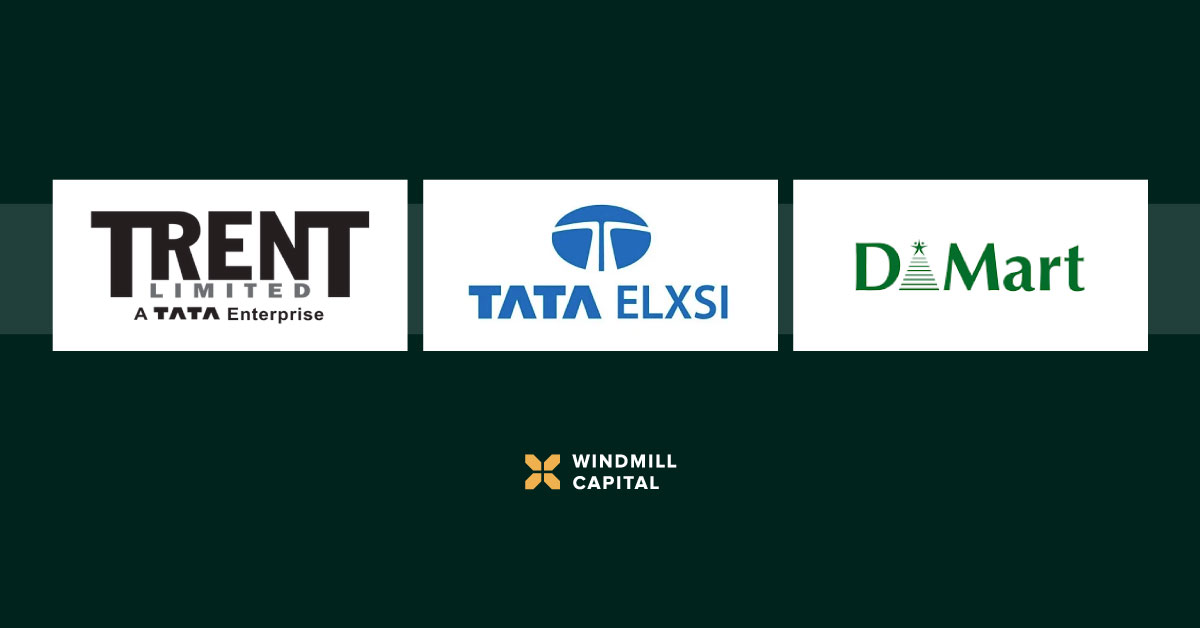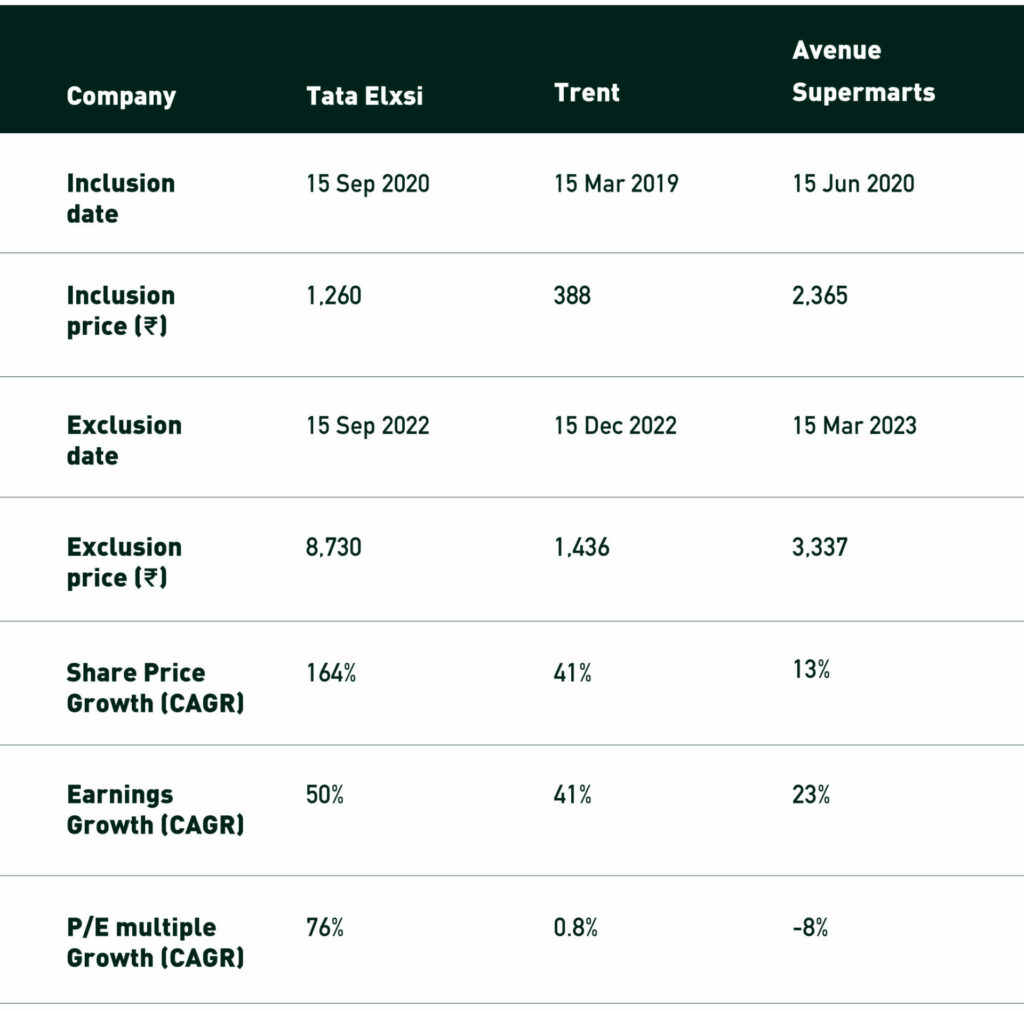smallcase in Focus: July 2023

Why has Windmill Capital dropped few high P/E stocks?
In the previous newsletter edition, we highlighted four high P/E stocks that we have continued to retain in our smallcases, in spite of high valuations. As a follow up to that, this time we have decided to write on a couple of high P/E stocks that we have dropped due to a combined reason of stretched valuations and visible decline in business prospects. The objective of this piece is to communicate that we don’t look at valuations in isolation and therefore if business fundamentals don’t give us confidence, we don’t hold onto such stocks.
For the purpose of this blogpost, we will put the spotlight on 3 companies that have been dropped from our smallcases in the recent past, where valuations along with growth prospects was a cause of concern. The 3 companies in discussion are – Tata Elxsi, Trent, and Avenue Supermarts.
Let us talk about each of these 3 companies individually, but before that it will be beneficial for you to check out their P/E ratios at the time we dropped them from our smallcases.

Tata Elxsi
Ever since the Russia-Ukraine conflict, the IT sector has had a tough time. There have been recessionary fears around the US and UK, steep rise in interest rates, and financial crises in key economic markets. Therefore the demand environment has been pretty lackluster over the past 15 months.
Now, there are two kinds of IT spends that take place – must-haves and good-haves. Must-haves are basically essential IT spends that companies need to do to ensure smooth functioning of their business, for example a banking company spending on their internet banking software services. Then comes, good-haves. These are not essential but discretionary spending that a company undertakes in order to enhance their business offerings, for instance an automotive company spending on research & development on new car infotainment systems.
So, Tata Elxsi caters more towards the latter section which is good-haves. Therefore, we felt that in a lethargic demand environment, the company won’t perform well, coupled with elevated valuations. And that is exactly how it played out. We made 164% returns on the stock (CAGR basis). After our removal, the stock corrected sharply as the results did not meet the street expectations and is down close to 20% since we have dropped it.
Trent
Trent is a fashion retailer that operates close to 7 brands, with two prominent ones – Westside (contributes 65 % to revenues) and Zudio (contributes 35 % to revenues). The interesting bit is that both of them cater to absolutely different markets. Westside caters to the mid to premium section of the society, while Zudio is a cost conscious brand that caters to the lower rung of the society with Average Selling Price (ASP) below ₹500.
It goes without saying that Westside is margin accretive for the company since they are relatively higher priced as compared to Zudio. Now, as per the recent quarters, Zudio format has started contributing heavily to Trent’s business. As a result, Trent has been witnessing constant margin decline. We believe that at some point, this margin dilution won’t bode well for the business. Needless to mention, the stretched valuations. Therefore, we decided to drop the company from our smallcases. Even though the company has risen by ~20% since our removal, our initial hypothesis of margin dilution has still not been arrested by the company. Therefore, we are satisfied to stay by the fences and monitor the situation until improvements begin to reflect.
Avenue Supermarts
Retail facing companies have been under immense pressure over the last couple of years, primarily on account of high inflation and in turn less disposable income for an average consumer. This has forced retailers, including Avenue Supermarts, to keep opening new stores in order to bump up their quarterly revenues. This strategy has kept Avenue’s revenue per square foot below their pre-pandemic levels.
Secondly, the continuous pressure on margins. You see, Avenue Supermarts is like a one-stop-shop for everything starting from groceries, crockery, appliances, luggage to apparel. Now, the interesting bit is their non-FMCG business, mainly merchandise & apparel, is where it derives the maximum margins, contributing ~25% to their revenues. And this category has been struggling for a while now.
As we have mentioned earlier, the biggest risk with a high P/E stock is that it doesn’t get any chance to underperform. The moment there is one bad quarterly result, the stock tends to correct sharply. Due to these factors, we decided to drop the company from our smallcases. We made 13% CAGR returns on the stock and in the last two quarters there aren’t any green shoots to be seen with respect to their business prospects.
I hope that would help you understand the business fundamentals picture of these three companies that led us to drop them from our smallcases. Now, let’s shift focus to an extremely interesting piece of data that we have crunched for you.

How to interpret this data? Let me explain with the help of an example. Look at Tata Elxsi for a moment. During our holding period, we made 164% returns on a CAGR basis. Now, the question we are asking is – what is driving this return, is it earnings or valuations? And the answer is loud and clear. For Tata Elxsi, the P/E multiple has grown by 76% whereas earnings has only grown by 50%. This tells you that most of the share price appreciation came from valuations multiple re-ratings and not earnings growth. The reason behind this is when a company does well, investor interest starts to build up, and then we see multiple P/E upward re-ratings, as price begins to inch up aggressively as against earnings. They are a typical momentum pick.
Contrary to this, when earnings rise more than price, we see a valuation de-rating like in the case of Avenue Supermarts. Reason being, that investors expect slowing growth for such companies, for a variety of reasons as highlighted above. Similarly there are companies which remain status quo as their earnings and share price increases or decreases at the same pace.
All in all, at Windmill Capital we give a lot of importance to business fundamentals. If the business fundamentals of a company look strong, we do not mind the high valuations. However, the idea is to remain ahead of the curve and understand the changing dynamics of a business quickly so that we can be on the right side of the investment.
Disclaimer: Investment in securities market are subject to market risks. Read all the related documents carefully before investing. Registration granted by SEBI, membership of BASL and certification from NISM in no way guarantee performance of the intermediary or provide any assurance of returns to investors. The content in these posts/articles is for informational and educational purposes only and should not be construed as professional financial advice and nor to be construed as an offer to buy/sell or the solicitation of an offer to buy/sell any security or financial products. Users must make their own investment decisions based on their specific investment objective and financial position and use such independent advisors as they believe necessary. Refer to our disclosures page, here.
Windmill Capital Private Limited – Research Analyst - SEBI reg. no: INH200007645; Compliance Officer – Ajoy Bharadwaj, Phone Number – 8296014433; Email Id - compliance@windmill.capital; Support email id - notifications@windmill.capital


